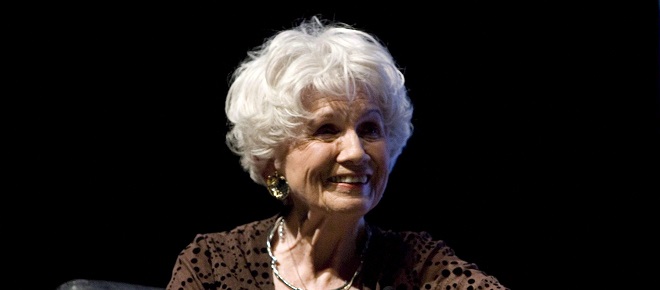Alice Munro reinforces the Canadian stereotype
The celebrated author won the Nobel Prize with predictable modesty
Canadian author Alice Munro attends the opening night of the International Festival of Authors in Toronto on Wednesday October 21, 2009. Munro has made the short list for this year’s Ontario Trillium Book Award. THE CANADIAN PRESS/Chris Young
Share

“I knew I was in the running, yes, but I never thought I would win.” —Alice Munro, on winning the Nobel Prize for Literature
On the list of flaws that afflict our country’s most celebrated exports, modesty ranks near the top. Certainly, the notion that Canadians are a modest people is fraught, because we all know more countrymen than we can count who are exceptions to that supposed truism. But then someone like Alice Munro, who’s obviously one of the most stunning authors of her time, professes to be surprised when the world recognizes her talent and gives her a Nobel Prize for Literature. That kind of modesty helps the Canadian stereotype endure, much as we may not deserve it.
Munro’s modesty is outweighed only by her deference to her country. “I am amazed and very grateful. I am a particularly glad that winning this award will please so many Canadians,” she said in a statement. “I’m happy that this will bring more attention to Canadian writing.” She could have talked about herself. She could have celebrated herself. Instead, Munro is just happy that Canadians are happy, and that other Canadian writers might benefit. Another Canadian stereotype, confirmed.
The whole thing is almost too nice, really, which neatly perpetuates the third in our country’s holy trinity of apparent virtues. To many, Canadians are a pleasant collection of modest, deferential, nice people. Every so often, one of us wins the greatest prize we could ever imagine, a signal to the world that giants are born in the great white north, and then no one publicly shows off (except once, in recent times, in Vancouver). The world goes on assuming we’re not cocky, narcissistic and mean, just like everybody else.
We can only hope Munro, who’s 82 years old and no longer publishing books, allowed herself a fist pump and maybe even a holler of joy. Maybe a slice of celebratory cake and a couple of glasses of wine. Behind closed doors, of course, where no one can see.
What’s above the fold
| The Globe and Mail | Ontario won’t build planned new nuclear reactors in the province. |
| National Post | Paul Desmarais‘ death echoes through the business world. |
| Toronto Star | Toronto’s community housing organization fired several managers. |
| Ottawa Citizen | Ottawa Mayor Jim Watson announced a $3-billion light rail plan. |
| CBC News | Canadian author Alice Munro won the Nobel Prize for literature. |
| CTV News | Munro called the world-renowned honour “quite wonderful.” |
| National Newswatch | Elections Canada wants to hear from witnesses at a robocalls trial. |
What you might have missed
| THE NATIONAL | National security. Canada’s spy agency thinks Mohamed Harkat is an al-Qaeda sleeper agent. Harkat, who arrived as a refugee claimant in 1995, has had his movements severely restricted by the feds for more than a decade after he was arrested and held under a controversial security certificate. Now, the Supreme Court will consider parts of his case. |
| THE GLOBAL | Haiti. Cholera victims and their families are accusing the United Nations of introducing the disease, which has killed over 8,000 people, to Haiti in 2010. They’re filing a claim, in hopes of receiving compensation. No conclusive evidence proves the UN is responsible, but the U.S. Centers for Disease Control and Prevention says Nepalese peacekeepers may be at fault. |
| THE QUIRKY | Berlusconi. The former Italian prime minister’s fiancee, 28-year-old Francesca Pascale, says she’s initiating a “spending review” at their home, Palazzo Grazioli. Pascale discovered that Berlusconi paid 16 times the normal price for green beans, and that staff were purchasing fish—even though, Pascale says, Berlusconi hates it. |